To receive Outreach information directly to your inbox, subscribe today and select Outreach and Education.
Read more farmer stories in our weekly blogs:
Lead Your FSA - Oregon FSA County Committee Member Promotes Importance of Indian Agriculture
By Cassie Bable, Public Affairs Specialist
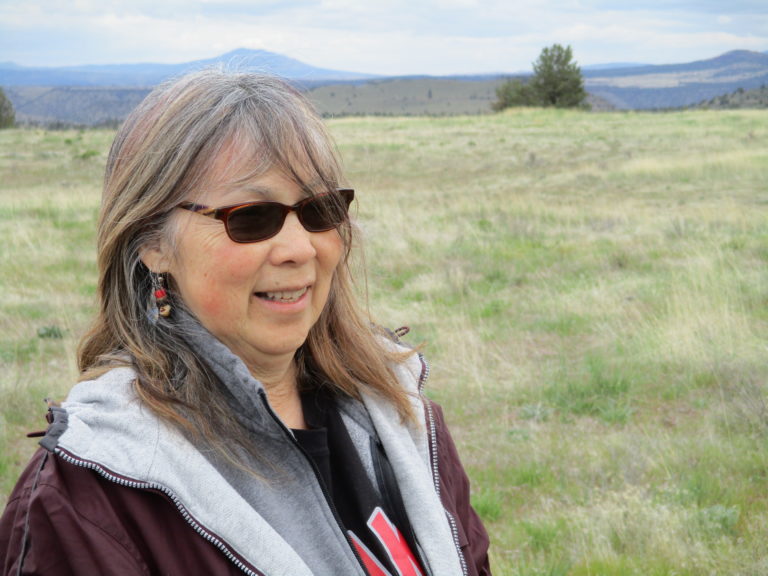 Sharing a Passion for her Culture and Agriculture
Sharing a Passion for her Culture and Agriculture
Beymer has worked with the Jefferson County FSA executive director to host more informational meetings on the reservation to explain FSA programs and loans.
The reservation spans across seven counties, is very rural and mostly open range. Beymer would like to see more agriculture practices on the reservation. She recalls traveling with her grandparents in the past and seeing more agriculture including cattle, alfalfa and grass hay.
“I want to promote the importance of Indian agriculture,” said Beymer. “There isn’t enough agriculture on the reservation and I want to provide support and information about agriculture on Indian land.”
Beymer is passionate about agriculture, her heritage and sharing information with fellow producers. She enjoys learning from the other FSA committee members and encourages producers to get involved with their FSA county committee.
“Make the commitment,” said Beymer. “Attend the meetings. Become aware and educated and do what you can to get the word out.”
For the digital version of this blog visit our interactive story map and check back as we add all of our county committee spotlights.
Ruth “Pinky” Beymer is the third generation to live on the Warm Springs Indian Reservation in central Oregon, which covers 560,000 acres of desert, mountains and water. She married into a ranching family in 1972, and after her husband passed away, took the reins of the operation and became involved in the livestock and logging industry. Beymer runs light-weight steers on dryland pastures and operates an underground heavy equipment construction business with her two children.
Serving and Important Role
Beymer serves on the Jefferson County Farm Service Agency (FSA) Committee as a voice for Native American producers. She has served two consecutive terms and is currently the vice-chair.
County committee members are elected by their peers and are a direct link between the agricultural community and USDA. Farmers on the committee help deliver FSA farm programs at the local level, help decide the kind of programs their counties will offer and work to make FSA agricultural programs serve the needs of local producers.
Each year, FSA accepts nominations for a certain Local Administrative Area (LAA) and the LAA up for election rotates each year.
Beymer knows she serves an important role on her county committee.
“I’m trying to promote and support all phases of Indian agriculture,” said Beymer. “We’ve been in a drought and fire situation, so we are trying to make people aware of those programs if they’ve had losses.”
FSA SCOREs One for New and Beginning Farmers
By: Dana Rogge, Public Affairs Specialist
From agronomist to meteorologist, farmers and ranchers wear many hats. It takes diverse skills and knowledge to care for the land, perfectly time crop planting and harvesting, market livestock, everything that impacts the farms bottom line.
USDA has many programs and services to help farmers build a strong and successful farm.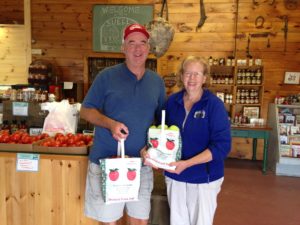
For the past year USDA has partnered with SCORE, the nation’s largest network of volunteer expert business mentors and resource partner of the U.S. Small Business Administration to provide agricultural producers an additional resource and guidance.
In Connecticut, Sara Kubick, New London County’s county executive director for the USDA Farm Service Agency (FSA), worked with the local SCORE mentor, Michael Del Vecchio, to let local producers know about the services SCORE offers. At a recent meeting, producers learned more about marketing their products and grant writing, as well as guidance on managing their farm finances.
“In addition to a significant family and emotional investment, farms are businesses. The folks operating the farm are experts in delivering their products and services, the same as any other successful business,” Michael said. “SCORE volunteers have significant background in the business world and can help with business planning and financial decisions. We leave the farming up to the farmers, but add real value by providing expert advising on how to succeed in business operations.”
Sara said mentors like Michael can offer a great service to her local customers.
“They [SCORE mentors] have business-savvy and have decades worth of experience,” Sara said. “They are helpful because they can talk to farmers in the avenue of cash flow and help them with the sorts of things they should be considering when treating their farm like a business.”
Disaster Program Helps Texas Farmer Recover from Hurricane Losses
By Shawn McCowan, Texas Public Affairs Specialist
Doug Harper, a fifth-generation farmer, moved to the Texas Gulf Coast area in 2012, looking forward to the potential for increasing corn, cotton, milo, and watermelon production there.Texas farmer Doug Harper comes from a long line of farmers. Growing up in the business, he knows there are always ups and downs, and the importance of insurance coverage to prevent against the “what ifs?” When challenges arose this past year, a USDA program enabled Harper to recover.
First, an unexpected large surge in watermelon production last June caused truckloads of watermelon to backup, including a few trucks full of Harper’s freshly harvested watermelons. Because of the delay in getting these watermelons to market, they were all rejected.
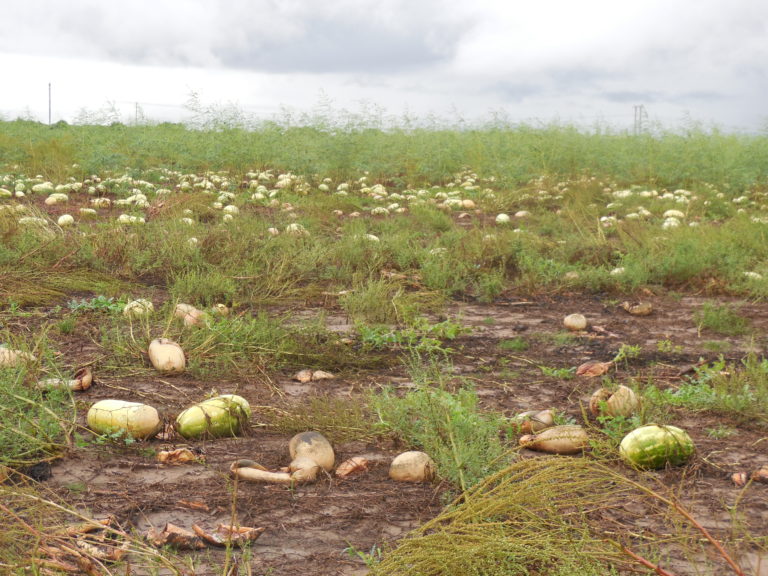
“I lost all profits, and I wasn’t expecting to recover anything after that loss,” Harper said.
But his losses were covered through the Noninsured Crop Disaster Assistance Program (NAP), which provides financial assistance to producers of noninsurable crops when low yields, loss of inventory, or prevented planting occur due to natural disasters. Beginning, limited resource and targeted underserved farmers or ranchers are eligible for a waiver of the service fee and a 50 percent premium reduction when they file form CCC-860, “Socially Disadvantaged, Limited Resource and Beginning Farmer or Rancher Certification.”
“(The program) saved me about $100 per acre,” he said.
Harper thought he had weathered the season’s crisis, but something much worse was close behind.
When Hurricane Harvey began its approach two months later toward the Gulf Coast, Harper quickly organized six trucks to begin moving as much of his cotton to higher ground that was possible. The day before the hurricane made landfall, he evacuated and hoped for the best.
He returned to find the hurricane devastated his crops, destroying more than 800 modules of cotton. When cotton is harvested, it is compressed into large modules that can weigh up to 5,000 pounds. Very little of his crop was salvageable. Even his entire 80-acres of watermelon were completely lost, just two weeks from blooming.
As part of the program, Harper reported the losses to his local office of USDA’s Farm Service Agency, which administers the program.
“Knowing I was covered by NAP took some of the stress away at a very difficult time,” Harper said. “I couldn’t help but wonder where I would get money to pay our bills, let alone rebuilding after such a loss.
”Harper said he believes the program will always be worth it to him.
“I highly recommend taking advantage of NAP,” he said. “It’s low-cost, good coverage. I will definitely continue to use NAP, and encourage others to do the same.”
Deadlines to apply for NAP coverage vary by state and crop. Contact your local FSA office to schedule an appointment to enroll. To find your local USDA Service Center visit offices.usda.gov.
FSA Partnerships Help New Farmers Connect to the Land
By Darrin Vanderplas, Massachusetts FSA Farm Loan Officer
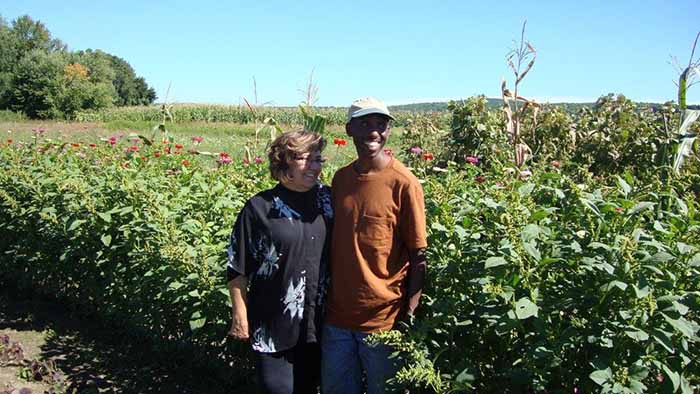 Growing up in Tanzania, East Africa, Sangiwa Eliamani became a skilled farmer, producing rice, millet and cotton throughout the year, using typical hand tools. He had no concerns about seasonal timing or finding markets for his crops, until he moved to the United States and attempted to farm in Massachusetts.
Growing up in Tanzania, East Africa, Sangiwa Eliamani became a skilled farmer, producing rice, millet and cotton throughout the year, using typical hand tools. He had no concerns about seasonal timing or finding markets for his crops, until he moved to the United States and attempted to farm in Massachusetts.
“Over there [in Tanzania] it’s very different,” he said. “We don’t have this limited time to grow, we have easier access to land and markets to sell our products.”
Sangiwa moved to the United States in hopes of better opportunities, but it seemed his passion for farming may be put on hold when he discovered high land prices, short growing seasons and complex crop marketing.
Though this realization came hard, Sangiwa could not stop thinking about cultivating the land. That’s when he found World Farmers/Flats Mentor Farm, an organization that assists and supports small farmers of diverse ethnic backgrounds by providing them with access to land, farming infrastructure and marketing assistance needed to sustain successful farming enterprises.
World Farmers/Flats Mentor Farm is one of several organizations that have partnered with the Massachusetts Farm Service Agency to help small, beginning and specialty farmers start or expand their operations. Through its Outreach and Education division, FSA works to develop partnerships with local, regional and national agricultural organizations through its more than 2,200 county offices nationwide.
“Farmers who do not speak perfect English feel they can go into the [FSA] office with their broken English and still receive valuable services,” said Maria Moreira, director of the World Farmers/Flats Mentor Farm program.
Since 1999, Maria and FSA County Executive Director Kip Graham have introduced more than 200 beginning farmers to USDA and FSA assistance including the Non-Insured Crop Disaster Assistance Program (NAP) and Microloan assistance.
“Because of this partnership, many farmers have rediscovered their connection to and passion for agriculture,” said Graham.
Sangiwa was one of them.
Sangiwa was approved for a Microloan and utilized some of FSA’s beginning farmer benefits like the fee waiver for NAP. He now rents 2 acres of land and the dream of purchasing his own farmland seems possible. The microloan helped Sangiwa purchase his own rototiller, farmers’ market tent, coolers, seeds and fertilizer.
The FSA microloan program is available to all farmers, including beginning, small and mid-sized farmers, providing up to $50,000 in loans using a simplified application process. Since the program began in 2013, over 20,000 farmers received microloans. About 70 percent of microloans are issued to beginning farmers and 55 percent to first-time FSA borrowers.
USDA Offers Opportunities to America's Veterans as they Seek Careers in Agriculture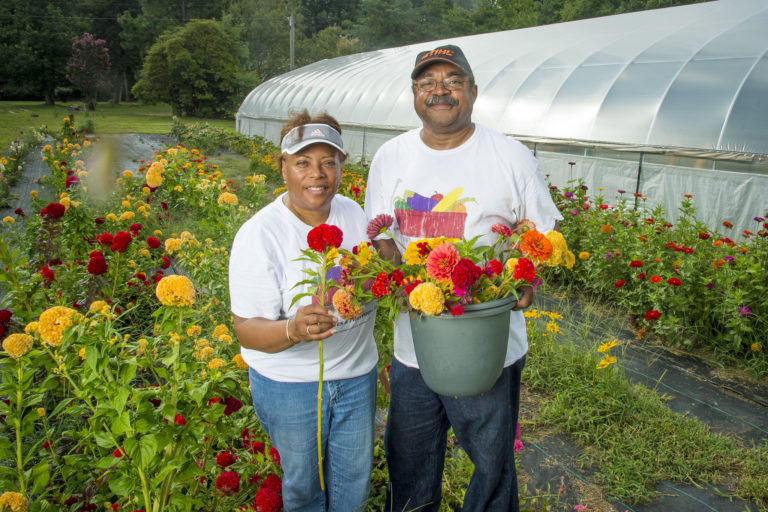
Thousands of veterans leave the military every year, but there’s a new “service” they can provide. Over the next few decades, the world will need to increase its food production to keep up with a growing population. Career options available to American vets in the agriculture sector include owning/operating your own farm, or working in one of the many areas that supports the nation’s rural fabric.
The U.S. Department of Agriculture (USDA) assists beginning farmers and ranchers, including veterans, in several ways. These include microloans, operating loans and other loan programs that help in buying or leasing farm land. Recently, USDA partnered with SCORE to provide mentorship to veterans and other beginning farmers who need business or other guidance as they prepare for their new careers.
Tom and Anita Roberson both served in the Army a combined 34 years and started Botanical Bites and Provisions in Fredericksburg, Virginia. They didn’t come from a farm background. Both worked in the medical field in the Army. After retiring, Tom worked in his private practice for several years before attending farming classes with his wife. Their son, Julian, helped with a business plan and Anita stressed having a business plan is extremely important. “If you want to get into farming, the only excuse that you have is yourself because the resources are there” said Anita. “USDA has plenty of resources.”
Not long after the Roberson’s finished school, they were operating their own farm growing and selling tomatoes, watermelons, squash, blueberries, other produce and also raising bees for honey.
These veterans heard the calling to enter farming. You can, too. To learn more about the USDA’s programs to help get started or if you have questions, visit https://newfarmers.usda.gov/veterans

